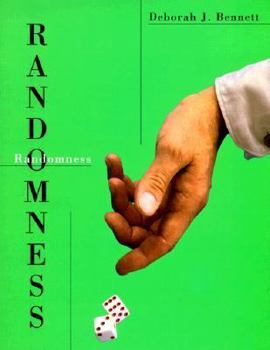Randomness
Select Format
Select Condition 
Book Overview
From the ancients' first readings of the innards of birds to your neighbor's last bout with the state lottery, humankind has put itself into the hands of chance. Today life itself may be at stake when probability comes into play--in the chance of a false negative in a medical test, in the reliability of DNA findings as legal evidence, or in the likelihood of passing on a deadly congenital disease--yet as few people as ever understand the odds. This book is aimed at the trouble with trying to learn about probability. A story of the misconceptions and difficulties civilization overcame in progressing toward probabilistic thinking, Randomness is also a skillful account of what makes the science of probability so daunting in our own day.
To acquire a (correct) intuition of chance is not easy to begin with, and moving from an intuitive sense to a formal notion of probability presents further problems. Author Deborah Bennett traces the path this process takes in an individual trying to come to grips with concepts of uncertainty and fairness, and also charts the parallel path by which societies have developed ideas about chance. Why, from ancient to modern times, have people resorted to chance in making decisions? Is a decision made by random choice "fair"? What role has gambling played in our understanding of chance? Why do some individuals and societies refuse to accept randomness at all? If understanding randomness is so important to probabilistic thinking, why do the experts disagree about what it really is? And why are our intuitions about chance almost always dead wrong? Anyone who has puzzled over a probability conundrum is struck by the paradoxes and counterintuitive results that occur at a relatively simple level. Why this should be, and how it has been the case through the ages, for bumblers and brilliant mathematicians alike, is the entertaining and enlightening lesson of Randomness.Format:Paperback
Language:English
ISBN:0674107462
ISBN13:9780674107465
Release Date:October 1999
Publisher:Harvard University Press
Length:256 Pages
Weight:0.60 lbs.
Dimensions:0.7" x 5.5" x 7.0"
Customer Reviews
5 ratings
The Science of Randomness!
Published by Thriftbooks.com User , 17 years ago
I believe that Dr. Bennett's book, Randomness, helps explain the science of it to the novice learner. Randomness is quite a science even though the results can differ from time to time. If you are in Atlantic City or Las Vegas, the science of randomness can help explain the roll of the dice. This book is interesting and easily read for those who are not so keen on mathematics like myself. Bennett's writing is to the audience and not at it which is essential in reading a book by this mathematician and college professor. Mathematics is not one of my favorite subjects but I recommend this book strongly to college bound students or anybody interested in broadening their minds to understanding the situation of random events and circumstances. Not everything can be explained by science, then there is randomness.
Probability from a popular and historical perspective
Published by Thriftbooks.com User , 22 years ago
Like some previous reviewers, I read "Randomness" because of references in Nicholas Taleb's book "Fooled by Randomness." Although Taleb focused on the last chapter, "Paradoxes in Probability," the bulk of Bennett's book is a popular history and development of probability theory from scientific, mathematical and philosophical perspectives. Although not as full of puzzles like the "Monte Hall" problem as expected, the unintuitive nature of determining probabilities is illustrated quite well by going over the intellectual development of the field. If you want an understanding of probability and why it is often so hard, "Randomness" is a great place to start.
Brilliant !!!
Published by Thriftbooks.com User , 24 years ago
"Human species does not have a very highly developed probabilistic sense": a thought that has been haunting me for years... This small and beautiful book gives the reader a fantastic insight into the history of randomness, the philosophy, and some of the biggest mistakes humans tend to make. After reading the book and somebody tells you that you have a 95% chance of being affected by illness XYZ, you will remember having read RANDOMNESS...
A Great First Book on Probability
Published by Thriftbooks.com User , 25 years ago
Professor Bennett's book does many things well. In its short space it can not do each fully, but nonetheless, she does an excellent coverage of history, philosophy, and applications. Although this is not the ideal book for learning to do probability, I suspect many students would find it helpful. As she herself demonstrates if you have not studied probability, you are doomed to misunderstand it even if you are otherwise mathematically sophisticated. Consequently, this book is ideal as an introduction to the subject for people at all levels. (For those who want to learn to do probability calculations, I would recommend two books. If you have not had calculus you might try the book by Samuel Goldberg. For those with calculus, I would suggest either the book "Probability for Engineers and Scientists" by R. W. Hamming or the book "Introduction to Probability Models" by Sheldon Ross.)
Superb
Published by Thriftbooks.com User , 26 years ago
I throughly Enjoyed this book and would recommend it to anyone,a s an introduction to the subject





